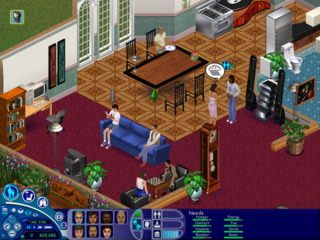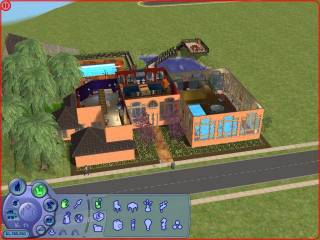A Salute to The Sims
By gamer_152 19 Comments
Nobody is exactly a stranger to The Sims. We’re all familiar with the concept behind the series and many of us have played the games before, yet I don’t think The Sims has ever quite gotten the recognition it deserves from “core gamers”. Games are entering a time where they’re being more closely scrutinised as a medium than ever before, and a lot of the people, me included, are lamenting that games on the whole don’t feel human or relatable enough. People are also trying to work out how to make video games that appeal to a wider audience without just dumbing them down or leaving them without substance. These are issues we’re still figuring out in 2013, and yet The Sims, the first edition of which was released in 2000, is human, deals with relatable situations, and appeals to a wider audience. I’m not trying to say The Sims was necessarily revolutionary, a lot of the tricks it employs to achieve its results only work within the framework of its “life simulator” design, but I still think the game itself and the effect it’s had is pretty mind-blowing.
Firestorms and the Toilet Game

It was an odd collection of events and experiences which inspired Will Wright to design the original Sims. Obviously the Sim series as a whole played no small part in influencing the game, and particularly important were those games where more detailed simulation of individual people had been required, like SimAnt and SimCopter. This series started with SimCity back in 1989, which was in turn inspired by the work Wright had done on his first game, a top-down helicopter shoot-‘em-up called Raid on Bungeling Bay. Wright said that it was having more fun building the cities for the game maps, than actually playing the game itself, which helped fuel the creation of SimCity. Among his more unusual influences however were his love of architecture (particularly a lengthy 1977 architecture book called A Pattern of Language), his wide range of academic interests, and Wright’s loss of his home. The inquisitive designer was one of the first victims of the 1991 firestorm in Oakland, California. His family home burned down and his possessions were destroyed, but following this he began thinking about people, their needs, and their material goods, once saying:
“I started to wonder about all the things we have and how we purchased them for a reason. Why do we need x or y or z? Why do we think something will make me happier? It almost came down to Maslow’s pyramid of needs.”
And so the idea for The Sims seeded itself in Wright’s mind. At first it was poorly received by his business associates, fellow developers, and focus groups, with the “virtual dollhouse” angle alienating creators, publishers, and players of video games alike. The concept apparently became a bit of a joke within Maxis, earning itself the label “The Toilet Game”, i.e. the game where you could make virtual characters go to the toilet. The Sims did not receive the official go-ahead, and so Wright took a spare tools programmer that Maxis were thinking of firing, and worked with him on a prototype for the game in secret. After producing a rough draft of what The Sims would eventually be, Wright was finally allowed to take the game into development, and despite prior adversity managed to design the best-selling PC game of all time, selling over 16 million units. The expansion packs then sold 6 million more copies, and when The Sims’s record was finally usurped, it was by The Sims 2 which sold over 20 million units. Even without counting expansion packs and spin-offs, The Sims games have collectively sold upwards of 46 million, an impressive figure.
Playing God

We know that when designing games, making things a means towards success or a metric of success makes players value them, but The Sims is able to do something very clever by making those means and metrics players’ characters’ moods, their physical and emotional needs, their relationships with others, their income, and so on. This technique makes The Sims feel familiar and relevant to us in an interesting way. Whoever you are, whatever you do, you can see a mirror of your life played out in The Sims in a fashion that you’re just not going to get with any other piece of media, because unlike other fiction The Sims is committed to not just investing us in the most exciting parts of a person’s life, but their life in its entirety. Every meal, every shower, every bathroom break, every time they go to work, every time they go to sleep. In it we see not quite the glamorous fantastical version of life portrayed in movies and books, but something a bit closer to what life is like for everyone in the real world.
This however, would be impossible if not backed up with good gameplay. The Sims is one of those fantastically designed games which despite being a sandbox with little plan from the designers on the path players take, is still able to use a careful web of interconnected systems to provide a steady and balanced stream of goals and tasks. Similar to the way Civilisation is infamous for letting players fall into the trap of repeatedly taking “Just one more turn”, The Sims is constantly providing you with a series of valuable short-term goals that seem quick and easy to attain, which when stacked together make longer-term goals surprisingly achievable. When you see your Sim is tired it feels so easy to put them to bed to refill that energy bar, then once they wake up and they’re hungry it feels so easy to give them breakfast, then to make them go to the bathroom, then shower, then go to work, and before you know it you’ve not only spent another hour on The Sims, but maybe your Sim is one step closer to that big promotion. In some ways this isn’t so far from how any video game works, but the whole thing stands up as a great example of the way games can take even fairly mundane things and make them interesting through proper use of gameplay.

The fact that The Sims is about the everyday doesn’t prevent it from being an empowerment fantasy either. One of the appealing things about the series is that it gives us a greater degree of control and agency over aspects of a person’s life than we often have within our own lives. Just as many action games allow us to experience wars, battles, and fights with far less pain and difficulty than we would in reality, The Sims allows us to quickly, painlessly, and with far from insurmountable odds fulfil fantasies of making large circles of new friends, taking up high-paying jobs, getting married, having children, and so on. Players can witness all of the ups and downs of life in a way that is engaging, but because this is all happening within a video game, be detached enough that it’s more manageable, less stressful, and can always be walked away from. The Sims also satiates the small god complex in every one of us. The ability to make people speak, eat, sleep, wake, walk, live, die, etc. at the click of a button makes us feel powerful. On top of this, despite the original game being released when it was, The Sims has retained more robust tools for creation and customisation than many games today. Few other games let you put such time, effort, and meticulous detail into creating environments and characters.
Aggressive Expansion
Of course, it’s impossible to talk about The Sims without talking about the towering offering of expansion packs that have surged forth from EA and Maxis over the years. This seemingly endless parade of add-ons and extras slowly became the subject of mockery, and while I believe there are problems with the way EA and Maxis are handling add-ons for the games, I think the popular opinion on them misses the mark by a fair bit. I don’t believe that The Sims should be admonished for playing host to a huge number of expansion and “Stuff” packs. In fact, I think the series should be applauded for it. If we’re going to celebrate that a game like Rock Band can offer players thousands of downloadable tracks, or that games like Little Big Planet and Animal Crossing can give people the chance to download masses of user-created content, then doesn’t it seem a bit hypocritical to laugh at The Sims for allowing players access to thousands of pieces of new content to add to their games? That’s not to say that there wasn’t and isn’t still a slightly extortionate element to the many expansion packs out there, but I don’t think it’s because of their sheer number.

Like a lot of add-on content these days, I don’t believe the “Stuff Packs” are always reasonably priced. When EA were just releasing them on-disc for those who didn’t have the internet connection to download them, maybe it could be justified, but the pricing on the digital versions seems harder to defend. An even bigger problem than this however, is the way that deliberate holes are being left in the design of the games so that consumers can be sold a somewhat predictable set of expansions to fill them. With the first and to some degree second game, it was easy to understand why the expansion content was the way it was, but when the base Sims 3 was lacking such basic and established features as pets and most weather, only for them to be later released as part of expansions, that was something else entirely. There even seems to be a vague template in place to make sure that Maxis don’t have to get too creative with the new expansions, they just need to make sure they put out the party/nightlife expansion, the pets expansion, the holiday expansion, and so on. It’s a bit disheartening when you can predict with fairly high certainty the content of the expansion packs for The Sims 4.
Despite this, I do have to commend EA/Maxis for their dedication in giving people the ability to mod their games so heavily, starting long before the age of DLC. Of course they weren’t the only people in the expansion pack game, but the quantity of ways they offered users to upgrade their games, even in the early 2000s, was remarkable. If we refer to games like Borderlands and Fallout as the kings of DLC, I don’t think it’s over-the-top to regard The Sims as the king of expansion packs, at least in its heyday.
So that’s The Sims. An underdog game that is compelling, original, human, and resonates with a larger audience in a way it’s hard not to respect, even if it is a bit commoditised by this point. Thanks for reading.
Sources
Eurogamer- The History of The Sims by Dan Whitehead
Rock, Paper, Shotgun- Making Of: The Sims by Kieron Gillen
The Washington Post- Guys and Digital Dolls by Bob Thompson
Berkleyside- Will Wright inspired to make The Sims after losing a home by Tracey Taylor
TMCnet.com- The Sims Franchise Celebrates Its Fifth Anniversary and Continues to Break Records
Business Wire- Furry Phones and Pocket Pups: The Sims 2 Pets Goes Mobile
Venture Beat- EA’s The Sims Social has stolen millions of players from Zynga by Dean Takahashi